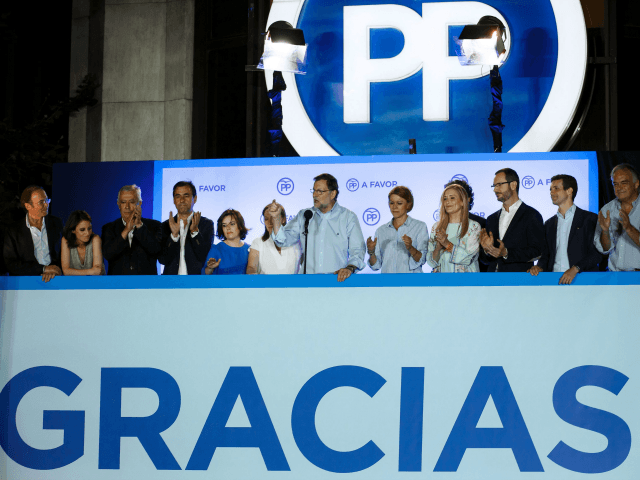AFP – Spain’s incumbent conservatives stole the show away from a far-left coalition led by Podemos Sunday, finishing stronger in repeat elections with more seats than in December polls though still falling short of a majority.
Acting Prime Minister Mariano Rajoy was the big winner of these second elections in six months, which saw all other parties lose parliamentary seats and/or votes.
The Unidos Podemos coalition was the hardest-hit, losing more than one million votes and reversing pre-election expectations that it would leapfrog over the Socialists to come second and replace them as the main left-wing force.
Rajoy was all smiles as he looked down from a tall podium on a crowd of supporters waving blue flags and shouting “yes we can!” — stealing Podemos’ key catchphrase.
“It’s been hard, it’s been difficult, it’s been complicated, but we put up a fight for Spain,” the 61-year-old said.
– Brexit influenced? –
The election came just three days after Britain’s shock vote to leave the European Union, pitting those hungry for change in a country with high unemployment against those who feared it would torpedo Spain’s slow economic recovery.
And while it was too early to tell, Thursday’s shock Brexit may have had a hand in the results as voters decided to stick with long-established parties rather than go for the radical change promised by the coalition, also composed of green-communists Izquierda Unida.
“The results are not satisfactory, we had different expectations,” Pablo Iglesias, the pony-tailed chief of Unidos Podemos, told reporters, his face sombre.
The results this time around were much the same as they were last December.
The conservative Popular Party (PP) came first, albeit without the absolute majority it needs — just as it did six months ago when Podemos and centre-right upstart Ciudadanos uprooted the country’s two-party dominance.
Official results showed that it won 137 seats — 14 more than in December.
The Socialists meanwhile made it to second place like in December, though with just 85 seats, their worst score in modern history.
Unidos Podemos gained 71 seats, coming third, and Ciudadanos only got 32.
The general election in December resulted in a 350-seat parliament so splintered that parties failed to agree on a coalition, and this is what prompted Sunday’s repeat vote.
All eyes will now be on subsequent coalition negotiations, with political leaders under more pressure this time to form some sort of government.
The PP with its higher number of seats will be in a position of force, though it will still need to seek the outright or tacit support of other parties to get a coalition or minority government through, as it does not have a majority.
It could form an alliance with Ciudadanos, though that would still not take them to the necessary 176 seats for an absolute majority, which may see them court the Socialists too.
– ‘Devil I know’ –
Throughout the campaign — and again Friday after the Brexit vote — the PP had hammered away at the need for stability in reference to the rise of Unidos Podemos, which like Greece’s ruling Syriza party rejects EU-backed austerity and pledges to fight for the least well-off.
Rajoy has argued that since the PP came to power in 2011, it has brought Spain back to growth and overseen a drop in unemployment — though at 21 percent it is still the second highest rate in the European Union after Greece.
But his rivals retort that inequalities have risen, the jobs created are mainly unstable, and they point to the repeated corruption scandals to have hit the PP.
Despite this, though, voters still went for the PP led by Rajoy, who has portrayed himself as a safe pair of hands.
Dancing while waving her PP flag in Madrid, Isabel Garcia Arias, a 70-year-old retired sports teacher, said the party represented “security for Spain.”
She added it had been particularly important to vote conservative this time round, “as we had the populists coming,” in reference to Unidos Podemos.
Meanwhile Luis Fernandez, a 37-year-old community organiser, said he had swapped the Socialists for Rajoy.
“I prefer the devil I know rather than the devil I don’t know,” he said at Madrid’s El Rastro flea market.

COMMENTS
Please let us know if you're having issues with commenting.